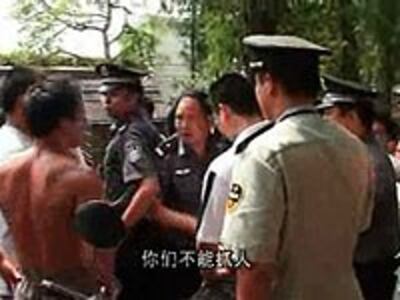
HONG KONG—Authorities in the southern Chinese province of Guangdong have released six residents of Taishi village and their lawyer Guo Feixiong without charge, after police failed to find enough evidence to prosecute them.
Guo and the villagers were detained following September clashes between police and villagers during a campaign to remove the elected chief of Taishi village, near Panyu district of Guangzhou, amid allegations of corruption surrounding a property deal.
"This afternoon at 3 or 4 p.m., the Panyu district procuratorate read out a statement to me that said they were not pressing charges against me," Guo told RFA's Mandarin service. "They thought that I had incited the people to cause trouble, but that my actions were not very serious, and therefore they were releasing me."
"I think that they changed their minds following a lot of pressure both within China and overseas," Guo said. "The other thing is that we didn't break the law in any way. We made no mistakes. We were simply and sincerely trying to push forward China's democracy. This is a very persuasive argument."
Official intimidation
Guo told Cantonese service reporter Lei Kin-kwan that local authorities were continuing to use "mafia tactics" including threats and violence against residents of Taishi village, who say their campaign to recall their village chief failed in the face of concerted official intimidation.
"The Taishi village incident will have a major impact on the advance of democracy in China," he said.
Beijing-based lawyer Gao Zhisheng, whose law firm lost its license after many of its lawyers became involved in the Taishi campaign, said the move was the result of total lack of evidence.
"They let him out the very last day of the deadline for holding him without charge. This is the last resort of the mafiosi," Gao said.
"They had already sent his case back to the police for further investigation and were unable to find the slightest evidence. So they let him out at the close of business on the very last day that they could hold him."
Comparisons with Shanwei
"The villagers’ demands haven't been met, and this indicates that the die-hard powers are still very strong, and they fear people’s demands," Gao said.
"Nevertheless, the Taishi incident, from a broad view, has great significance. It has given a powerful impetus to the spread of democracy," he said. "Just like the effect of a small lever moving a big object, it has brought a huge impact on all walks of life, including different factions in offices, colleges, and universities, and in the media."
Local residents confirmed the release of the last Taishi villagers to be held by police following the mid-September clashes. "Yes, yes, today," one villager said. "There were six of them. They have all gone home already. They were in good health."
Analysts pointed to possible links between the release of the Taishi villagers and the bloodshed further up the coast in Dongzhou township near the port city of Shanwei, where villagers say around a dozen of their number died after police fired live ammunition on a crowd of protesters.
Taishi protest used 'legal means'
Deputy law researcher at the China Academy for Social Sciences Fan Yafeng said the Shanwei incident might be a factor in the release of Guo and the six other villagers.
"The authorities took different attitudes to the incidents in Taishi village and in Shanwei, mainly because the villagers in Taishi village didn't use violence," Fan told an RFA discussion panel Wednesday.
"In the circumstances you can see the release of the Taishi villagers and lawyer as a conciliatory move, as a major compromise on the part of the authorities, which are usually very hard line at the moment. I don't think they would have been released if the Shanwei incident hadn't happened," he said.
China-based Internet author Wen Kejian said the relatively peaceful nature of the Taishi recall campaign had affected the outcome.
"In the Taishi village incident you had a lot of intellectuals getting involved who used legal methods and legal means to pursue their goals," Wen said. "It's important to look at the difference between that the way that the Shanwei incident ended up, and that's to do with the different methods that the villagers used to fight for their rights."
The Taishi standoff, widely seen by Chinese scholars and the legal profession as a test of local governments1 commitment to village democracy and rule of law, began in July after a 100 million yuan (U.S. $12 million) land deal involving more than 2,000 mu (133 hectares) of village land.
On the night of Dec. 6, in Dongzhou Township, near the southern Chinese port of Shanwei, armed police opened fire on thousands of angry villagers protesting compensation for land used to build a local power station.
Three people have been officially confirmed dead by the authorities, but many more are still missing.
Villagers say that more than a dozen of their number were killed by riot police firing live ammunition. Police say protesters attacked first with home-made explosives, and that they reacted "in alarm."
Original reporting in Mandarin by Lin Di and in Cantonese by Lei Kin-kwan. RFA Mandarin service director: Jennifer Chou. RFA Cantonese director: Shiny Li. Translated and written for the Web in English by Luisetta Mudie. Edited by Sarah Jackson-Han.
